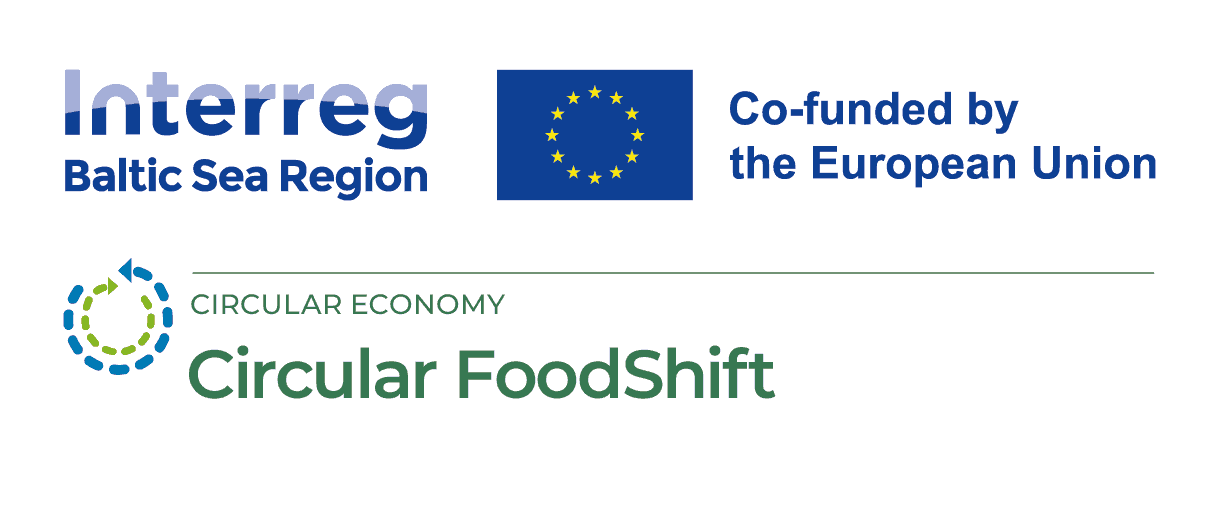
Driving change towards a circular and sustainable food system in the Baltic region
06 August 2025
Circular FoodShift is a two-year project co-funded by the Interreg BSR Programme, brought together a cross-sectoral partnership composed of public authorities, NGOs, SMEs and public educational institutions from five program countries.
The project focuses on Tartu-, Latgale- and Vilnius regions. The three regions are all geographically located in the eastern part of the Baltics and have many challenges in common.
Background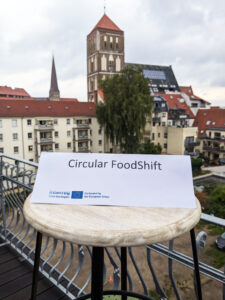
Various regional municipalities across the Baltic countries have put food and sustainability as a priority in their long term regional strategic plans. However, there are clear impediments on the development of resilient, sustainable and circular food systems, namely the lack of:
- awareness
- experience
- competencies
- how to work with circular economy at the regional and local municipality level
- scarcity in the cross-sectoral bottom-up collaboration
The main objective of the project was capacity building in circular economy for food for the municipalities and schools, with the involvement of food producers and businesses, and to accelerate the cross-sector and transnational collaboration between stakeholders in Tartu-, Latgale- and Vilnius regions.
We aimed to provide the local and regional authorities with good practices, new impulses and innovative solutions for reshaping the way food is sourced, consumed, and valued in public institutions across the project regions.
How we worked
The first step was to identify three entry points that was of great interest to our target- and stakeholder groups, and also where interventions and significant improvements were needed.
Regular project partners’ meetings, where each partner could provide useful information on local challenges and needs, and using the cross-sectoral “Capacity Building Methodology” that we developed, helped us to customise the capacity building activities to meet the need of our target- and stakeholder groups.
- Entry point 1 – Introducing and experimenting with the new technological innovation called “Dynamic Food Procurement” (DFP) which aims to cut food waste and reduce supply chain distances, it clearly revealed the need for procurement specialists and its stakeholders to optimise local food procurement for school meals.
We put focus on opening their mindset for innovative and dynamic approaches, to support procurement specialists to increase their cooperation between regions in- and outside the project, helping them to share practical experiences of local authority school procurement- and policy initiatives. - Entry point 2 – The “Making the School Community Food-Wise” pilot program, was developed to support the school community in promoting food education and creating a more student-focused approach to school catering. As part of this development program, schools learned to improve their catering practices for food waste prevention by working together as a team. This team included students, parents, teachers, school leaders, cooks, the school nurse, and local government specialists. The team started by doing a self-assessment and then created an action plan, which they later put into practice. The development program has a long-term impact, because the team continues to work together and keep food topics in focus even after the program ends.
- Entry point 3 – The international webinar and workshop series brought together vocational schools, teachers and students from various study programs, with the aim to help them understand better what circular economy means, from theory to practice, focusing on sustainable and circular business models.
During the webinars, participants gained new knowledge, learned how sustainability and circular food topics are taught in different vocational schools in Estonia, Finland, Latvia and Lithuania, and how to get started to teach circular food systems in vocational schools.
Key results and stakeholder engagement
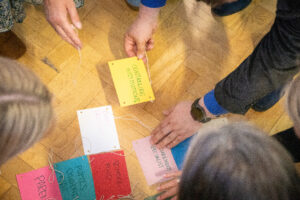 The procurement focused activities, engaged over 40 procurement specialists and agencies, small food producers, and municipal representatives to explore innovative, legal and sustainable local food sourcing models. Best practices and knowledge from Denmark, Estonia, Finland, France, Latvia, Lithuania and Sweden were shared to inspire regional solutions.
The procurement focused activities, engaged over 40 procurement specialists and agencies, small food producers, and municipal representatives to explore innovative, legal and sustainable local food sourcing models. Best practices and knowledge from Denmark, Estonia, Finland, France, Latvia, Lithuania and Sweden were shared to inspire regional solutions.
“A comprehensive and diverse diet is crucial, and equally important is the origin of food ingredients. A short supply chain offers significant advantages from both economic and food security perspectives”, says Kadri Leetsaar, head of the development department at Tartu municipality.
Key takeaways from the “Dynamic Food Procurement Days“.
“Making the School Community Food-Wise” pilot program engaged five schools in Tartu County to co-develop student-centred food systems. The program helped to improve the communication between catering staff and schools’ management, make school meals tastier (caterers are more motivated, and students are more actively providing feedback), and food education is receiving increased attention in schools.
“The project provides the school community with an opportunity to make school catering more sustainable, supporting children’s eating habits, reducing food waste, and fostering diverse and creative integration of food education”, says Tuuli Taimur, Nutrition consultant and trainer at Toiduharidus OÜ in Estonia.
This program has supported the creation of a long-term vision for a sustainable school food system by promoting circular economy for food principles. As a next step, the program will be tested in five more schools starting autumn of 2025.
The international vocational school webinars trained 40 educators from Estonia, Latvia, Lithuania, and Finland in integrating circular food principles into culinary and hospitality education.
It has engaged them to initiate cooperation with other vocational schools outside their country, and with various disciplines, to plan and implement transnational activities with focus on capacity building on sustainable and circular food practices of their students.
The School Chefs’ Masterclasses in Latvia trained 43 chefs and catering professionals with practical tools for sustainable and zero waste cooking. A spotlight was placed on legumes as a nutritious, low-waste ingredient.
School chefs gained highly practical knowledge on how to improve their understanding of sustainable food systems. The trainings provided valuable insights tailored specifically for school kitchen staff, boosting their sense of self-worth and professional recognition.
“In the face of rising food insecurity and environmental challenges, the Circular FoodShift project offers a transformative path forward – turning waste into value, fostering sustainable innovation, and empowering communities to build resilient, regenerative food systems for the future we all deserve”, says Igors Nikitin, Entrepreneur and social leader, owner at SIA IGGI company in Latvia.
The collaborative paper, “Local and Circular Food System in Baltic Countries“, offers a research-based perspective on the region’s green transition and showcases key examples of systemic innovation.
Most important achievements and highlights of the Circular FoodShift project
From the very start of the project, each project partner, through own communication channels and language, had the role and responsibility to keep local target- and stakeholder groups involved and informed about the project progress, challenges, and goals. This included providing regular updates, to ensure engagement by proximity and sense of directly being part of it.
Thanks to this communication strategy, and trough the training programs, workshops, and collaborative development processes we facilitated, the project reached and empowered key stakeholders in target groups – school chefs, educators of vocational schools, municipal leaders and procurement specialists, in and outside the project regions.
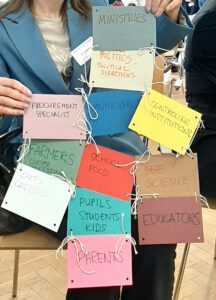 Building on the communication strategy, one important achievement of ours was when the city of Daugavpils in May 2025 became the heart of an important regional dialogue on sustainable school food systems. The School Food Forum gathered more than 80 participants from Latvia, Estonia, Lithuania, Finland, and Sweden, bringing together educators, policy-makers, procurement experts, local producers, and civil society leaders to rethink the future of food in schools.
Building on the communication strategy, one important achievement of ours was when the city of Daugavpils in May 2025 became the heart of an important regional dialogue on sustainable school food systems. The School Food Forum gathered more than 80 participants from Latvia, Estonia, Lithuania, Finland, and Sweden, bringing together educators, policy-makers, procurement experts, local producers, and civil society leaders to rethink the future of food in schools.
Another highlight has been the development of the network of organisations that have been directly engaged in collaborative activities to share knowledge and best practices, leading to creative solutions. As an example, the Circular FoodShift Talks, a space for open discussions, exchange and learning, where each episode highlights real-world examples, solutions and pilot actions implemented by project’s consortium, other projects and stakeholders from program countries.
The cooperation combined with the skill set in the partnership was vital to reaching the milestones, and to finalising the deliverables and outputs, which enhanced operational efficiency, fostered problem-solving, and ultimately translated project goals into hands-on action.
Final words
The transnational focus has been essential; that includes the constructive support from PA Bioeconomy coordinators from the Nordic Council of Ministers’ Secretariat, making us understand better the priorities and the action plan for sustainable and circular food systems in the Baltic Sea Region.
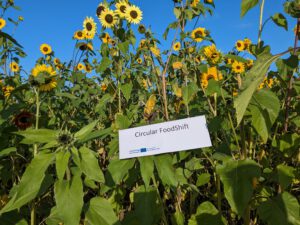 Having active participants from target- and stakeholders from regions in Vilnius, Tartu, Tallinn, Latgale, Riga, Copenhagen, Senäjoki, Karlstad, Malmö, Vallentuna and the UK, has provided a range and variety of potential solutions.
Having active participants from target- and stakeholders from regions in Vilnius, Tartu, Tallinn, Latgale, Riga, Copenhagen, Senäjoki, Karlstad, Malmö, Vallentuna and the UK, has provided a range and variety of potential solutions.
Without the transnational cooperation, we as the project consortium wouldn’t be able to learn collectively, and increase the engagement of our target groups, but most importantly, wouldn’t be able at this wide scale to identify the circular efforts and practices that are being developed and piloted in various BSR regions. The transnational cooperation speeds up the process, and increases the motivation for our local and regional authorities with the support of all parties involved.
WRITTEN BY JENNIFER AVCI





